谈谈虚拟条件从句的省略与倒装
(完整版)虚拟语气用法小结

虚拟语气用法小结一、虚拟语气在条件从句中的用法条件句有两类,一类是真实条件句,一类是虚拟条件句。
如果假设的情况是有可能发生的,就是真实条件何.在这种真实条件句中的谓语用陈述语气。
如: If it doesn't rain tomorrow, we will go to the park.如果假设的情况是过去或现在都不存在的,或将来不大可能发生的,则是虚拟条件句。
如: If he had seen you yesterday, he would have asked you about it。
如果他昨天见到你,他会问你这件事的。
(事实上他昨天没见到你,因此也未能问你这件事。
)1。
在含有虚拟条件句的复合句中,主句和从句的谓语都要用虚拟语气。
虚拟条件从句和主句的动词形式列表如下:2。
错综时间条件句:有时条件从句中的动作和主句中的动作发生的时间不一致(表示错综时间的虚拟语气),这时动词的形式要根据它所表示的时间加以调整。
If you had listened to the doctor, you would be all right now。
如果你当初听了医生的话,身体现在就好了。
(从句动作指过去,主句动作指现在)3。
省略连词if (倒装)。
在书面语中,如果虚拟条件从句中有were,had 或 should,可以把if省略,把这几个词放到主语之前,构成主谓倒装.Should he come (If he should come), tell him to ring me up.Were I you (If I were you), I would not do it。
Were I to meet him tomorrow (= if I were to met him tomorrow), I should ask him about it。
要是我明天见到他,我就会问他这件事的。
Had I had the money last year (= if I had had the money last year), i would have bought the house. 如果我去年有了这笔钱,我就买那所房子了.Should there be any trouble with the boiler, the automatic controlling unit would cut off the fuel oil supply. 假如锅炉出问题的话,自控装置会自动切断燃油的供给.4。
虚拟语气倒装的用法归纳
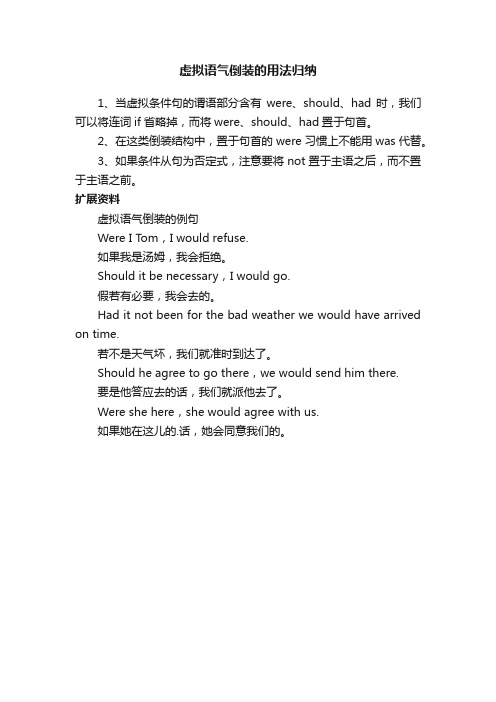
虚拟语气倒装的用法归纳
1、当虚拟条件句的谓语部分含有were、should、had时,我们可以将连词if省略掉,而将were、should、had置于句首。
2、在这类倒装结构中,置于句首的were习惯上不能用was代替。
3、如果条件从句为否定式,注意要将not置于主语之后,而不置于主语之前。
扩展资料
虚拟语气倒装的例句
Were I Tom,I would refuse.
如果我是汤姆,我会拒绝。
Should it be necessary,I would go.
假若有必要,我会去的。
Had it not been for the bad weather we would have arrived on time.
若不是天气坏,我们就准时到达了。
Should he agree to go there,we would send him there.
要是他答应去的话,我们就派他去了。
Were she here,she would agree with us.
如果她在这儿的.话,她会同意我们的。
虚拟条件句中if的隐含或省略

虚拟条件句中if的隐含或省略语言是灵活多变的,表达是丰富多彩的。
有的时候虚拟语气的表现形式也显得非常灵活,比如就说其中的虚拟条件吧——它有时会以if从句来表示,但有时会用某种短语来表示,比如不定式短语、分词短语、介词短语等等。
1. if的隐含I should be happy to go with you.如果能与你一起去,我将很高兴。
句中的不定式短语to go with you就是表示虚拟条件的,它相当于if I could go with you。
这句话的言外之意是:可惜我不一定有机会同你一起去。
To have studied harder, you would have passed the examination.你学习更用功些,你早就考及格了。
句中的不定式短语to have studied harder也是表示虚拟条件的,它相当于if you had studied harder。
句子的言外之意是:可惜你当时没有更用功我,所以你就没有考及格。
Failing this time, what would you do?假若这次失败,那你怎么办?句中的分词短语failing this time表示虚拟条件,相当于if you failed this time。
其言外之意是:尽管失败的可能性很小,但还是有可能会失败,假若失败了,那怎么办?Without your help, we couldn’t have succeeded.如果没有你的帮助,我们就不会取得成功。
句中的介词短语without your help表示虚拟条件,相当于if you hadn’t given us help。
其言外之意是:好在你帮助了我们,所以我们取得了成功。
I didn’t know that he was a cheat, or else I wouldn’t have believed him.我不知道他是个骗子,不然我也不会相信他了。
虚拟语气和倒装句讲解
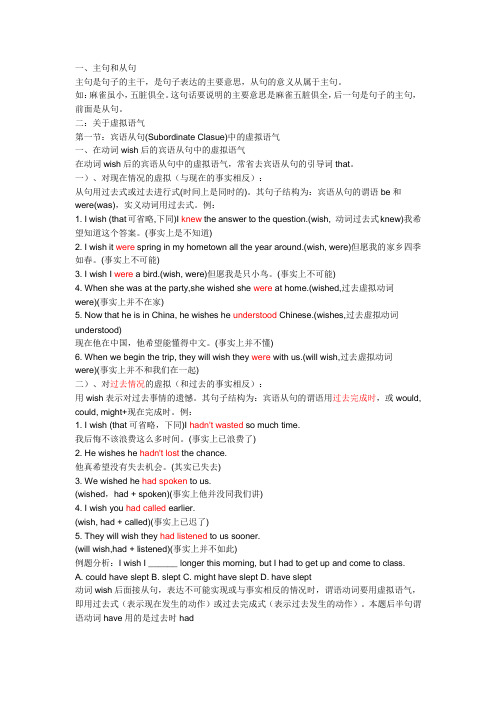
一、主句和从句主句是句子的主干,是句子表达的主要意思,从句的意义从属于主句。
如:麻雀虽小,五脏俱全。
这句话要说明的主要意思是麻雀五脏俱全,后一句是句子的主句,前面是从句。
二:关于虚拟语气第一节:宾语从句(Subordinate Clasue)中的虚拟语气一、在动词wish后的宾语从句中的虚拟语气在动词wish后的宾语从句中的虚拟语气,常省去宾语从句的引导词that。
一)、对现在情况的虚拟(与现在的事实相反):从句用过去式或过去进行式(时间上是同时的)。
其句子结构为:宾语从句的谓语be和were(was),实义动词用过去式。
例:1. I wish (that可省略,下同)I knew the answer to the question.(wish, 动词过去式knew)我希望知道这个答案。
(事实上是不知道)2. I wish it were spring in my hometown all the year around.(wish, were)但愿我的家乡四季如春。
(事实上不可能)3. I wish I were a bird.(wish, were)但愿我是只小鸟。
(事实上不可能)4. When she was at the party,she wished she were at home.(wished,过去虚拟动词were)(事实上并不在家)5. Now that he is in China, he wishes he understood Chinese.(wishes,过去虚拟动词understood)现在他在中国,他希望能懂得中文。
(事实上并不懂)6. When we begin the trip, they will wish they were with us.(will wish,过去虚拟动词were)(事实上并不和我们在一起)二)、对过去情况的虚拟(和过去的事实相反):用wish表示对过去事情的遗憾。
英语倒装、强调和省略语法点
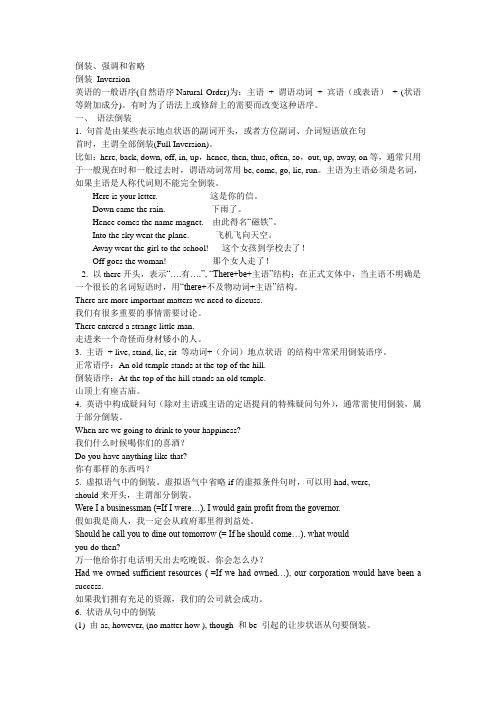
倒装、强调和省略倒装Inversion英语的一般语序(自然语序Natural Order)为:主语+ 谓语动词+ 宾语(或表语)+ (状语等附加成分)。
有时为了语法上或修辞上的需要而改变这种语序。
一、语法倒装1. 句首是由某些表示地点状语的副词开头,或者方位副词、介词短语放在句首时,主谓全部倒装(Full Inversion)。
比如:here, back, down, off, in, up,hence, then, thus, often, so,out, up, away, on等,通常只用于一般现在时和一般过去时,谓语动词常用be, come, go, lie, run。
主语为主语必须是名词,如果主语是人称代词则不能完全倒装。
Here is your letter. 这是你的信。
Down came the rain. 下雨了。
Hence comes the name magnet. 由此得名“磁铁”。
Into the sky went the plane. 飞机飞向天空。
Away went the girl to the school! 这个女孩到学校去了!Off goes the woman! 那个女人走了!2. 以there开头,表示“….有….”, “There+be+主语”结构;在正式文体中,当主语不明确是一个很长的名词短语时,用“there+不及物动词+主语”结构。
There are more important matters we need to discuss.我们有很多重要的事情需要讨论。
There entered a strange little man.走进来一个奇怪而身材矮小的人。
3. 主语+ live, stand, lie, sit 等动词+(介词)地点状语的结构中常采用倒装语序。
正常语序:An old temple stands at the top of the hill.倒装语序:At the top of the hill stands an old temple.山顶上有座古庙。
省略和倒装语法解释

多变的省略句掌握好省略句,应注意以下几条:1.感官动词或使役动词(如:notice, hear, let, make)等后接不定式作宾补时省略to,被动时to不能省略。
2.在prefer to do rather than…, cannot help but…do, nothing …but等句型中常省略to。
3.为避免重复,作某些动词(hope, want)等宾语或(tell, order, ask)的宾补时,省略不定式短语,只保留to.4.应注意状语从句、定语从句中的省略。
5.注意not ,so ,neither, nor的“替代性”省略。
6.状语从句中,如果谓语含动词be,主语又与主句主语一致或主语是it,从句中主语和be一齐省略。
7.常见的省略形式:(1)If (it is)possible[如果可能的话];(2)If (it is) necessary[如果必要的话];(3)If any: 例: Correct the mistakes in the passage if (there is) any (mistakes)比较:Do you have anything to say? (不知道对方是否有话要说,) Do you have something to say?(认为对方有话要说.)一、替代省略1. 用it, one, that,ones, those替代句子中重复出现的名词、代词或句子。
one是指代同名称的另一样东西(同类异物),代替前面句子中重复出现的可数名词;that替代特指可数或不可数名词,后面常跟有in或of短语作后置定语;it指代同名称的同样事物(同类同物)。
例:One took a taxi, and the other walked home. I haven’t a book, can you lend me one?2."So / Nor(Neither)+谓语+主语"这种句型是用来替代前面提到的情况,表明它也适用于后者。
倒装与省略

倒装句一、全部倒装全部倒装是指将句子中的谓语动词全部置于主语之前。
此结构通常只用与一般现在时和一般过去时。
常见的结构有:1.here, there, now, then, thus等副词置于句首,谓语动词常用be, come, go, lie, run。
There goes the bell.铃响了。
2.表示运动方向的副词或地点状语置于句首,谓语是表示运动的动词。
In came the teacher.老师进来了。
注意:上述全部倒装的句型的主语必须是名词,如果主语是人称代词则不能完全倒装。
Here he comes. 他来了。
3.表地点的词语置于句首或强调地点概念时用全部倒装。
On the table were some flowers.桌子上有一些花。
二、部分倒装部分倒装是指将谓语的一部分如助动词或情态倒装至主语之前。
如果句中的谓语没有助动词或情态动词,则需添加助动词do, does或did,并将其置于主语之前。
常见的情况有:1.带有否定意义的词或短语放在句首,语序需要部分倒装。
常见的词语有:not, never, seldom, scarcely, barely, little, at no time, not only, not once, under no condition, hardly... when, no sooner... than..., not until...等。
Neither will theory do without practice,nor will practice do without theory.理论离不开实践,实践也离不开理论。
Not only did he refuse the gift, he also severely criticized the sender.他不仅拒收了礼品,还狠狠批评了送礼的人。
注意:当not until引出主从复合句时,主句倒装,从句不倒装。
通过高考题讲解虚拟语气的省略与倒装
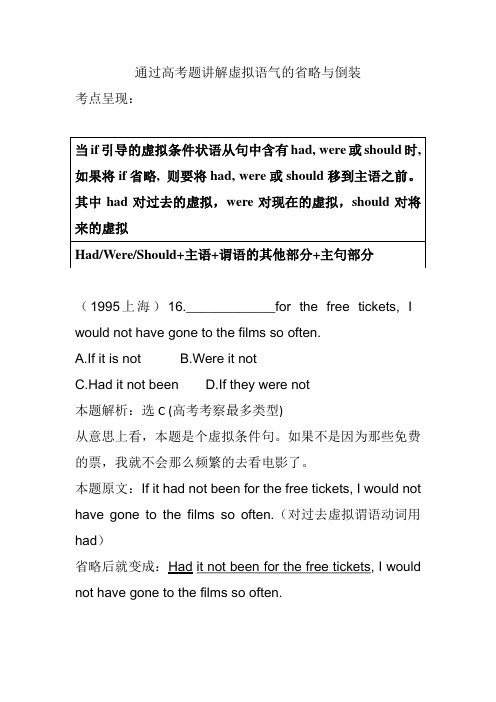
通过高考题讲解虚拟语气的省略与倒装考点呈现:(1995上海)16.____________for the free tickets, I would not have gone to the films so often.A.If it is notB.Were it notC.Had it not beenD.If they were not本题解析:选C (高考考察最多类型)从意思上看,本题是个虚拟条件句。
如果不是因为那些免费的票,我就不会那么频繁的去看电影了。
本题原文:If it had not been for the free tickets, I would not have gone to the films so often.(对过去虚拟谓语动词用had)省略后就变成:Had it not been for the free tickets, I would not have gone to the films so often.(2006湖北) 31.fired, your health care and other benefits will not be immediately cut off.A.Would you be B.Should you beC.Could you be D.Might you be本题解析:选B从意思上看,本题是个虚拟条件句。
如果你被解雇了,你的医保和其他福利将会被立即切断。
本题原文:If you should be fired, your health care and other benefits will not be immediately cut off.(对将来虚拟谓语动词用should)省略后就变成:Should you be fired, your health care and other benefits will not be immediately cut off.(2010浙江) 10.Had I known about this computer program, a huge amount of time and energy .A.would have been saved B.had been savedC.will be saved D.was saved本题难点就是虚拟语气的倒装考察的是主句部分。
虚拟语气和倒装

as引导的让步状语从句要用倒装语序 n(不带冠词)/adj/ adv/ v+ as + subject + be/情 态动词
Child as he is, he knows a lot about the world. =Though he is a child, he knows a lot about
Without electricity, there would not be modern industry. 没有电,就没有现代工业。
(2)通过上下文,句中往往有 otherwise, or等词。如:
I was very busy yesterday. Otherwise I would have come to see you. 我昨天很忙,要不然我就来看你了。
the world.
单数可数名词作表语提前不用冠词
Young as he is, he knows more than you.
Hardly …when, No sooner….than,(只倒主句,主 句一般用过去完成时而从句用过去时。)
neither… nor…(两个都倒)
not only…(只倒前面)
当这些词作形容词修饰主语时且置句首时,句子不倒装。
Little work was done yesterday
Neither has he called on her, nor will he do so.
倒装
倒装的目的: 语法结构的需要:通常疑问句、there be 结构等需 要用倒装句。例如: There is a bridge across the river. 河上有座桥。 Where are you going? 你上哪去?
虚拟语气的常见易错点探析

考点剖析英语句子的语气是通过句中谓语动词的不同形式来体现。
一般说来,英语句子的语气是用来说明说话者的主观愿望、目的和意图等。
陈述语气、疑问语气、祈使语气和虚拟语气是常见的四种语气。
陈述语气是陈述一个事实或提出一种想法的语气。
疑问语气用来提出问题或者询问情况。
祈使语气用来向对方提出请求、邀请,给予忠告、指示、警告、命令等。
而虚拟语气是表示一种假想或主观愿望,动词需用某种特殊的形式。
虚拟语气对于很多学生来说是一个难点。
下面,结合近几年全国各地高考英语试卷中考查虚拟语气的真题,来分析、归纳虚拟语气的常见易错点,以期对同学们有所帮助。
一、非真实条件句的倒装与省略常见易错点【经典例题】____(be)time to go to back,I would study double hard.【答案与解析】Were。
句意:如果时光能够倒流,我会加倍努力学习。
根据主句谓语动词would study 可知本题考查与现在情况相反的假设,根据虚拟语气的对应规则,可知if引导的非真实条件句的谓语动词应用一般过去式,又因为本句考查的是if虚拟条件句的省略,把were提到句首,省略if。
故填Were。
【方法点拨】if引导非真实虚拟条件句时,如果主句的谓语动词部分含有were、should、had这三个词时,我们可以将were、should、had放到从句的主语之前,从而省略从属连词if。
这种用法也是虚拟条件句的倒装与省略。
如:Had I worked hard,I would have surely succeeded.=If I had worked hard,I would have surely succeeded.如果当时我努力学习,我当然会成功的。
Should Mary come(=If Mary should come),I would criticize her.玛丽要是来了,我一定会批评她。
Were the sun to rise in the west(=If the sun were to rise in the west),she would not change her mind.即使太阳从西边出来,她也不会改变主意的。
倒装及强调和省略句

从句
主语为it且从句谓语中有 ②Though (they were)
虚拟 语气
在虚拟条件句中, 如含有 略, 句子要用倒装
had, were, should, if可省 twenty now, I would
种类
要点归纳
典句例示
动 词 不 定 式
感官动词或使役动词(如 feel, see, hear, notice, let, I heard someone 不 make, have等)后接不定 sing in the next 定 式作宾语补足语时省略 room. 式 to 符 号 ①He did nothing 在do nothing but, can’t to but wait all the time. help but, why not, would 的 ②Rather than ride rather. . . than. . . ; prefer 省 on a crowded bus, to do. . . rather than. . . 略 he always prefers to 等句型中省略to ride a bicycle.
No sooner…than… Hardly/scarcely/barely…when… e.g. No sooner had he closed his eyes _____ than the doorbell rang.(2002) when Hardly had he sat down _____the phone rang.(2010)
If I were to do it, I’d do it some other way.
Were I to do it, I’d do it some other way. If you had been here earlier, you would have seen him.
谈谈虚拟条件从句的省略与倒装
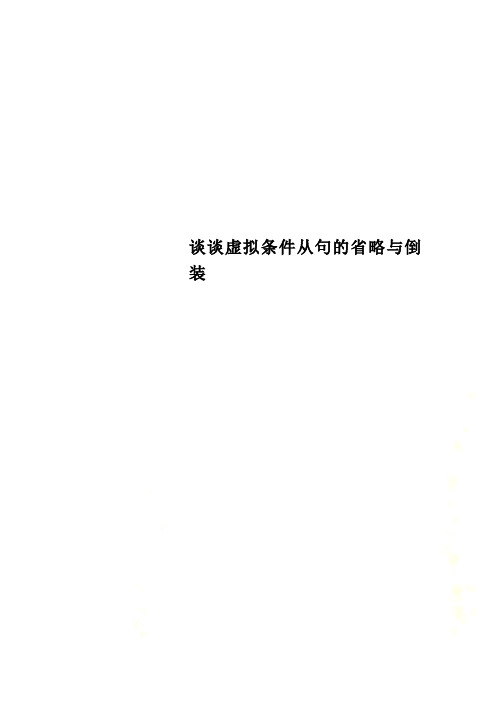
谈谈虚拟条件从句的省略与倒装谈谈虚拟条件从句的省略与倒装当虚拟条件句的谓语部分含有were, should, had时,我们可以将连词if省略掉,而将were, should, had置于句首。
如:If she were in charge, she would do things differently.=Were she in charge, she would do things differently. 如果是她负责,她会是另一种做法。
If you should change your mind, no one would blame you.=Should you change your mind, no one would blame you. 万一你改变主意,谁也不会怨你。
If the management had acted sooner, the strike wouldn’t have happened.= Had the management acted sooner, the strike wouldn’t have happened. 如果资方早些采取行动,就不会发生罢工了。
几点说明:1. 对于条件从句含有should而主句使用陈述语气或祈使语气的句子也可以采用以上方法进行省略和倒装。
如:If I should be free tomorrow, I will come. = Should I be free tomorrow, I will come. 如果明天我有空我就来。
If they should attack us, we’ll wipe them out completely.=Should they attack us, we’ll wipe them out completely. 假如他们进攻我们,我们就把他们彻底消灭干净。
有时被提到句首的had不是助动词,而是表示“有”的实义动词。
语法:虚拟语气和倒装句
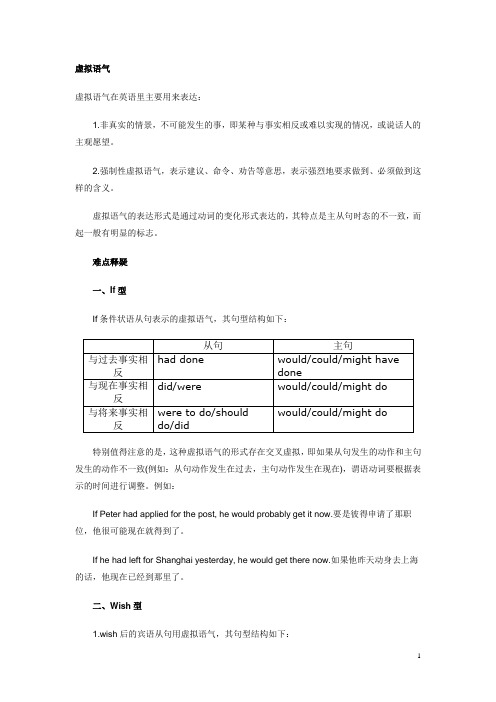
虚拟语气虚拟语气在英语里主要用来表达:1.非真实的情景,不可能发生的事,即某种与事实相反或难以实现的情况,或说话人的主观愿望。
2.强制性虚拟语气,表示建议、命令、劝告等意思,表示强烈地要求做到、必须做到这样的含义。
虚拟语气的表达形式是通过动词的变化形式表达的,其特点是主从句时态的不一致,而起一般有明显的标志。
难点释疑一、If型If条件状语从句表示的虚拟语气,其句型结构如下:特别值得注意的是,这种虚拟语气的形式存在交叉虚拟,即如果从句发生的动作和主句发生的动作不一致(例如:从句动作发生在过去,主句动作发生在现在),谓语动词要根据表示的时间进行调整。
例如:If Peter had applied for the post, he would probably get it now.要是彼得申请了那职位,他很可能现在就得到了。
If he had left for Shanghai yesterday, he would get there now.如果他昨天动身去上海的话,他现在已经到那里了。
二、Wish型1.wish后的宾语从句用虚拟语气,其句型结构如下:与过去事实相反wish that 从句的谓语动词用had done与现在事实相反wish that 从句的谓语动词用did与将来事实相反wish that 从句的谓语动词用would/could do例如:I wish they would change the menu.他们要是改变一下菜单就好了。
I wish I hadn’t spent so much money.我要是没花那么多的钱就好了。
同样地,在as if/as though引导的宾语从句中和以if only引导的带有感叹色彩的虚拟语气句子中,谓语动词与wish引导的宾语从句中的虚拟形式相同。
2.由if only 引导的虚拟语气与过去事实相反if only 谓语动词用had done与现在事实相反if only 谓语动词用did例如:If only she had asked someone’s advice! 她要是征求了别人的意见就好了!3.由as if/as though 引导的虚拟语气与过去事实相反as if/as though谓语动词用had done与现在事实相反as if/as though谓语动词用did例如:He talks about Rome as if he had been there himself.谈论起罗马来就像他去过似的。
高中语法精讲虚拟语气

高中语法精讲虚拟语气(1)对现在的虚拟If从句主句did/were would/should/could/might doIf I were you, I would tell her the truth.=Were I you, I would tell her the truth.If条件句的倒装:去掉if, 句子部分倒装(半倒装,即以前学过的一般疑问句的语序)备注虚拟语气中,不管主语是不是单数都用were(2)对过去的虚拟If从句主句had done would/should/could/might have doneIf you had taken my advice, you would have passed the exam.=Had you taken my advice, you would have passed the exam.省略if(3)对将来的虚拟If从句主句did/should do/were to do would/should /could/might doIf he didn't come tomorrow, we would put off the meeting.=If he should come tomorrw, we would put off the meeting.=If he were to come tomorrw, we would put off the meeting.总结主过将从过主过将完从过完[例1](陕西卷)If we ___the other road, we might have arrived here in time for the meeting.A. takeB. had takenC. tookD. have taken答案B主句是过将完,所以从过完,过去完成时[例2](天津卷)--John went to the hospital alone.--If he___me about it, I would have gone with him.A. should tellB. tellsC. toldD. had told答案D[例3] (2013重庆)- It rained cats and dogs this morning. I'm glad we took an umbrella.- Yeah, we would have got wet all over if we__A. hadn'tB. haven'tC. didn'tD. don't答案A省略特殊情况①错综时间条件句例: If you had followed my advice just now, you would be better now.If you had studied hard before, you would be a college student now.做题时注意:动词的形式根据它所表示的时间作出相应的调整。
倒装句与省略句讲解

倒装句与省略句倒装句和省略句是英语中常用的两种特殊句式。
倒装句是指由于修辞的需要,谓语动词发生前移的语句。
省略句,省略句子中的某个或某些成分。
有了倒装句和省略句,英语句子家族更加多姿多彩,语言表达也更加丰富了。
一、倒装句英语句子的语序有时由于修辞的需要,把谓语或部分谓语提到主语之前,这样的句子称为倒装句。
倒装句分为完全倒装(谓语全部置于主语之前)和部分倒装(部分谓语放在主语之前)两种。
1 完全倒装句子的主语较长时(多数情况下又没有宾语),因为要避免头重脚轻的感觉,通常把表语或状语放在句子的前面。
例如:Before the thief stood John who was a detective and had arrested him twice.这个小偷的面前站着曾逮过他两次的探长约翰。
In the small box was the ring that he had given her twenty years before.那个小盒里面是那枚他二十年前送给她的戒指。
So shocked was she at the news that he had died the day before.获悉他昨天去世的消息,令她十分震惊。
2 部分倒装(1)so, neither, nor位于句首,表示与前面谓语所述情况相同。
例如:I am a doctor.我是医生。
So am I.我也是(医生)。
He will go skating.他要去滑冰。
So will she.她也要去(滑冰)。
I didn't finish my homework.我作业没写完。
Neither did I.我也没写完。
I haven't been to the Summer Palace.我没有去过颐和园。
Neither have I.我也没有去过(颐和园)。
The two-year-old child can not eat a meal herself; nor can she dress (herself).这个两岁的孩子还不会自己吃饭,她也不会自己穿衣服。
英语虚拟语气及倒装精简总结
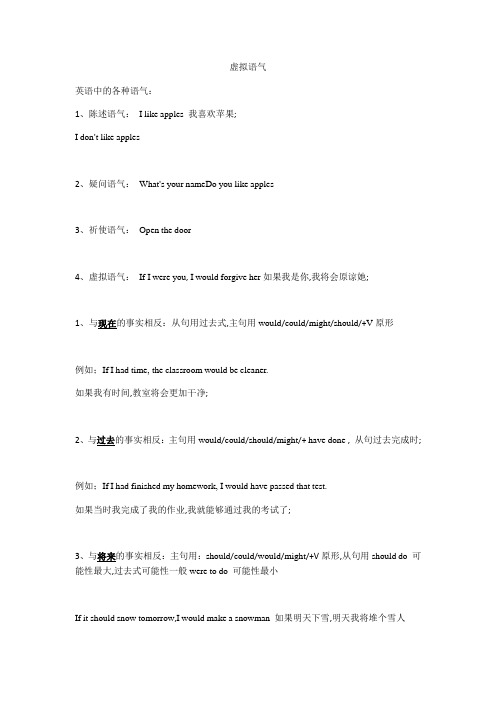
虚拟语气英语中的各种语气:1、陈述语气:I like apples我喜欢苹果;I don't like apples2、疑问语气:What's your nameDo you like apples3、祈使语气:Open the door4、虚拟语气:If I were you, I would forgive her如果我是你,我将会原谅她;1、与现在的事实相反:从句用过去式,主句用would/could/might/should/+V原形例如;If I had time, the classroom would be cleaner.如果我有时间,教室将会更加干净;2、与过去的事实相反:主句用would/could/should/might/+ have done , 从句过去完成时;例如;If I had finished my homework, I would have passed that test.如果当时我完成了我的作业,我就能够通过我的考试了;3、与将来的事实相反:主句用:should/could/would/might/+V原形,从句用should do可能性最大,过去式可能性一般were to do可能性最小If it should snow tomorrow,I would make a snowman如果明天下雪,明天我将堆个雪人If it snowed tomorrow,I would make a snowman如果明天下雪,明天我将堆个雪人If it were to snow tomorrow ,I would make a snowman如果明天下雪,我将对个雪人虚拟语气的倒装形式If I had worked hard, I would have finished it如果当时我努力工作,我就已经完成它了; Had I worked hard, I would have finished itIf it should snow tomorrow, I would make a snowmanShould it snow tomorrow, I would make a snowmanIf it were to snow tomorrow, I would make a snowmanWere it to snow tomorrow ,I would make a snowman虚拟语气在各类从句中的用法1、I lifted the chair so that I could be seen我举起椅子就是为了能被看见状语从句状语从句中常见连接词:as if好像,as though好像,in order that为了,for fear that生怕,In case万一;2、主语从句:It is +形容词+that+ 主语+should+动词原形,should可以省略It is very important that we should study English every day我们每天学习英语是很重要的;3、宾语从句;I wish I would visit the moon我祝愿自己能有一天拜访月球;宾语从句常见句型:主语+常见动词+that+ 主语+ should+动词原形I suggest that you should do your homework我建议你应该做你的作业;4、表语从句;He looked as if he had been here for many years他看起来好像已经很多年了;5、同位语从句:I make a proposal that we should hold a meeting next week我提议下周召开一次会议虚拟语气常见词汇:demand,require,proposal,advise,order,suggest虚拟语气的其他用法:6、祝愿:Long live peace和平万岁7、It is hightime that+ 主语+ should/过去式:该做……的时候了;It's time that we had a break我们早该休息了;It's hightime that we should protect ourselves我们是时候保护我们自己了;8、If only引出感叹句,意思是“要是…..多好”,表示说话人的一种愿望;表示现在的情况,应用过去式;表示过去的情况,应用过去完成时态表示将来的情况,用would+动词原形If only he didn’t drive so fast.现在Look at the terrible situation I am in If only I had followed your advice.过去If only the rain would stop将来9、Even if/even though表示一种让步语气,即使...也做不成某事;表示现在的情况,应用过去式表示过去的情况,应用过去完成时态Even if he were here,he could not solve the problem.Even if I had been busy then,I would have helped you.练习:1. If only he ____quietly as the doctor instructed, he would not suffer so much now.A. liesB. layC. had lainD. should lie2. How I wish every family ____a large house with a beautiful garden.A. hasB. hadC. will haveD. had had3. You did not let me drive. If we ____in turn, you ____ so tiredA. drove; didn’t getB. drove; wouldn’t getC. were driving; wouldn’t getD. had driven ; wouldn’t have got4. _____it rain tomorrow, we would have to put off the visit to the Yangpu BridgeA. WereB. ShouldC. WouldD. Will5. I suggested the person _____ to be put into prisonA. refersB. referringC. referredD. refer6. When a pencil is partly in a glass of water, it looks as if it____A. breaksB. has brokenC. were brokenD. had been broken7. I insisted _____to see a doctor, but he insisted nothing ___ wrong with himA. on him to go; should beB. he went; beC. he go; wasD. he should to; is8. ---Your aunt invites you to the movies today---I would rather she ____ me tomorrow than todayA. tellsB. toldC. would tellD. had told9. ---Would you have called her up---Yes, but I ____busy doing my homeworkA. wasB. wereC. had beenD. would be10. I was ill that day, otherwise I ____ the sports meetA. would have taken part inB. took part inC. had taken part inD. would take part in倒装句为了强调或平衡句子结构,英语中常用倒装;倒装有全部倒装和部分倒装;全部倒装是指将句子中的谓语动词全部置于主语之前;部分倒装是指将谓语的一部分如助动词或情态动词置于主语之前;如果句中的谓语没有助动词或情态动词,则需添加助动词do,does或did等,并将其置于主语之前;1.以here,there,now,then等地点或时间副词开头的句子,谓语动词是be, come, go, remain 等,而主语又是名词时,用全部倒装;注意:如果句子的主语是代词时,则不倒装;如:Here comes the bus/ Here it comes2.有些动词与副词out,in,up,down,away等构成不及物动词短语;为了使句子更生动,常将这些副词提前到句首,这时用全部倒装;注意:句子的主语是代词时,则不倒装;如:Up went the rocket. / Up it went.3.将表示地点的介词短语放在句首进行强调时,使用全部倒装;谓语动词常为不及物动词;如:From the window came the sound of music.4.当句子主语部分较长,谓语部分较短,或为了强调句子的表语时,常使用全部倒装;句子的结构为“表语+系动词+主语”;如:Gone are the days when we had nothing to eat.5.if虚拟条件状语从句中,如果将连词if省略,需用部分倒装;如:Were I you, I would go there.6. as引导的让步状语从句的倒装有如下几种形式:1 从句的谓语部分为“不及物动词+副词”时,常将此副词提前到从句句首;如:Hard as you try, you will not be satisfied.2 从句的谓语部分为“情态动词+不及物动词”时,常将此动词提前到从句句首;如:Wait as you may, he will not see you.3 从句的谓语部分是“系动词+形容词”时,常将此表语形容词提前到从句句首;如:Proud as the nobles are, they are afraid to see me.4 从句的谓语部分是“系动词+单数名词”时,则常将这个表语提前,但要省略名词前的不定冠词;如:Child as he is, he can tell right from wrong.7.具有半否定意义的词或短语位于句首时,用部分倒装;如:seldom, rarely, not, never, by no means, in no time, hardly...when, no sooner...than, not only...but also等;如:Not only does he do well in his lessons, but also he often helps others with their lessons. Hardly did I notice the signal when I caught by police.8.“only+状语”位于句首时, 用部分倒装;如:Only then did I know the importance of English.9.so...that结构中,有时要强调so所修饰的形容词或副词,常将so 连同它所修饰的形容词或副词一起提前放在句首;如:So bright was the moon that the flowers seem as bright as by day.10. 最突出、最常见的修辞效果就是强调,其表现形式如下:1only +状语或状语从句置于句首,被该状语修饰的句子用部分倒装;Only in this way can you solve this problem.只有用这种方法,你才可以解决这个问题;Only after he had spoken out the word did he realize he had made a big mistake.只有当他已经说出那个字后才意识到自己犯了个大错误;2 hardly,in no way,little,scarcely,seldom,never,no more,no longer,not,not only,no sooner,not only …but also,not until…等具有否定意义的词或词组位于句首,句子用部分倒装;Hardly do I know chemistry.= I hardly know chemistry.1. Not until I began to work ____ how much time I had wasted.A. didn't I realizeB. did I realizeC. I didn't realizeD. I realized2. Only by practising a few hours every day ____ be able to master the language.A. you canB. can youC. you willD. will you3. If you don't go, neither ____.A. shall IB. do IC. I doD. I shall4. No sooner ____ to the station ____ the train left.A. had I got, whenB. I had got, thanC. had I got, thanD. did I get, when5. ——Your father is very strict with you.____. He never lets off a single mistake of ours.A. So he isB. So is heC. He is soD. So does he6. ____ today, he would get there by Sunday.A. Would he leaveB. Was he leavingC. Were he to leaveD. If he leave7. Never in my life ____ such a thing.A. I have heard or have seenB. have I heard or seenC. I have heard or seenD. did I hear or see8. ——Here ____ Where is Xiao LiuThere ____.A. comes the bus, is heB. comes the bus, he isC. the bus comes, is heD. the bus comes, he is9. ____ , I will not buy it.A. Much as do I like itB. As much I like itC. Much as I like itD. As I like it much10. ——I like football. I don't like volleyball.A. So do IB. Neither do IC. So it is with meD. So is it with me。
英语语法倒装结构,省略结构
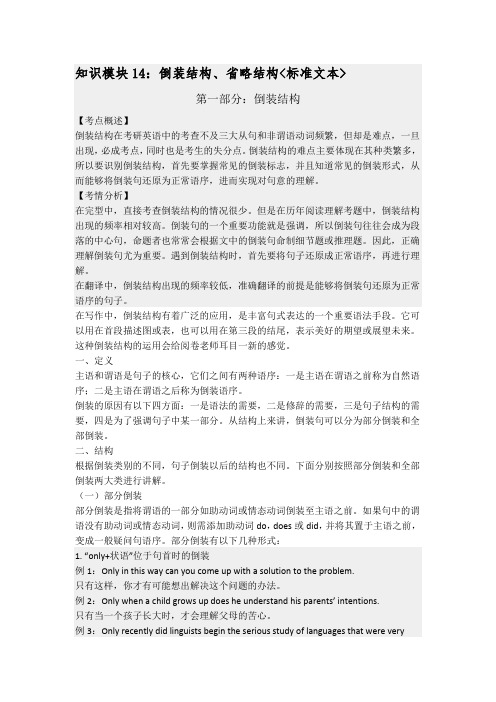
知识模块14:倒装结构、省略结构<标准文本>第一部分:倒装结构【考点概述】倒装结构在考研英语中的考查不及三大从句和非谓语动词频繁,但却是难点,一旦出现,必成考点,同时也是考生的失分点。
倒装结构的难点主要体现在其种类繁多,所以要识别倒装结构,首先要掌握常见的倒装标志,并且知道常见的倒装形式,从而能够将倒装句还原为正常语序,进而实现对句意的理解。
【考情分析】在完型中,直接考查倒装结构的情况很少。
但是在历年阅读理解考题中,倒装结构出现的频率相对较高。
倒装句的一个重要功能就是强调,所以倒装句往往会成为段落的中心句,命题者也常常会根据文中的倒装句命制细节题或推理题。
因此,正确理解倒装句尤为重要。
遇到倒装结构时,首先要将句子还原成正常语序,再进行理解。
在翻译中,倒装结构出现的频率较低,准确翻译的前提是能够将倒装句还原为正常语序的句子。
在写作中,倒装结构有着广泛的应用,是丰富句式表达的一个重要语法手段。
它可以用在首段描述图或表,也可以用在第三段的结尾,表示美好的期望或展望未来。
这种倒装结构的运用会给阅卷老师耳目一新的感觉。
一、定义主语和谓语是句子的核心,它们之间有两种语序:一是主语在谓语之前称为自然语序;二是主语在谓语之后称为倒装语序。
倒装的原因有以下四方面:一是语法的需要,二是修辞的需要,三是句子结构的需要,四是为了强调句子中某一部分。
从结构上来讲,倒装句可以分为部分倒装和全部倒装。
二、结构根据倒装类别的不同,句子倒装以后的结构也不同。
下面分别按照部分倒装和全部倒装两大类进行讲解。
(一)部分倒装部分倒装是指将谓语的一部分如助动词或情态动词倒装至主语之前。
如果句中的谓语没有助动词或情态动词,则需添加助动词do,does或did,并将其置于主语之前,变成一般疑问句语序。
部分倒装有以下几种形式:1. “only+状语”位于句首时的倒装例1:Only in this way can you come up with a solution to the problem.只有这样,你才有可能想出解决这个问题的办法。
六种部分倒装倒装句用法详解

六种部分倒装倒装句用法详解在学习英语的过程中,应该有很多人搞不清楚倒装句的用法吧,以下是店铺整理的英语倒装句部分倒装的用法,希望对大家有所帮助。
1. 否定副词位于句首时的倒装在正式文体中,never, seldom, rarely, little, hardly, scarcely, no sooner, no longer, nowhere 等含有否定意义的副词若位于句首,则其后要用部分倒装:I shall never forgive him. / Never shall I forgive him. 我永远不会宽恕他。
He seldom goes out for dinner. / Seldom does he go out for dinner. 他很少出去吃饭。
She hardly has time to listen to music. / Hardly does she have time to listen to music. 她几乎没时间听音乐。
He little realizes how important this meeting is. / Little does he realize how important this meeting is. 他不甚明白这个会议的重要性。
We had no sooner reached the airport than the plane took off. / No sooner had we reached the airport than the plane took off. 我们刚到机场,飞机就起飞了。
【注意】(1) 对于not…until句型,当not until…位于句首时,其后的主句要用倒装语序:He didn’t leave the room until the rain stopped. / Not until the rain stopped did he leave the room. 雨停了之后他才离开这房间。
英语虚拟语气的语法归纳
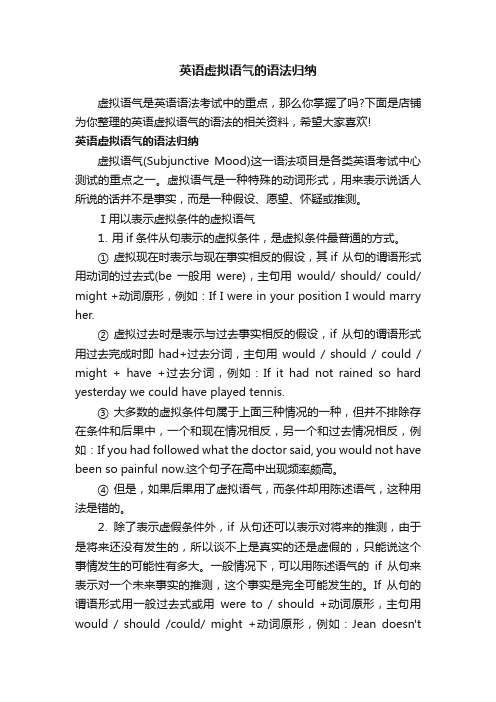
英语虚拟语气的语法归纳虚拟语气是英语语法考试中的重点,那么你掌握了吗?下面是店铺为你整理的英语虚拟语气的语法的相关资料,希望大家喜欢!英语虚拟语气的语法归纳虚拟语气(Subjunctive Mood)这一语法项目是各类英语考试中心测试的重点之一。
虚拟语气是一种特殊的动词形式,用来表示说话人所说的话并不是事实,而是一种假设、愿望、怀疑或推测。
Ⅰ用以表示虚拟条件的虚拟语气⒈ 用if条件从句表示的虚拟条件,是虚拟条件最普通的方式。
① 虚拟现在时表示与现在事实相反的假设,其if 从句的谓语形式用动词的过去式(be 一般用were),主句用would/ should/ could/ might +动词原形,例如:If I were in your position I would marry her.② 虚拟过去时是表示与过去事实相反的假设,if 从句的谓语形式用过去完成时即had+过去分词,主句用would / should / could / might + have +过去分词,例如:If it had not rained so hard yesterday we could have played tennis.③ 大多数的虚拟条件句属于上面三种情况的一种,但并不排除存在条件和后果中,一个和现在情况相反,另一个和过去情况相反,例如:If you had followed what the doctor said, you would not have been so painful now.这个句子在高中出现频率颇高。
④ 但是,如果后果用了虚拟语气,而条件却用陈述语气,这种用法是错的。
⒉ 除了表示虚假条件外,if从句还可以表示对将来的推测,由于是将来还没有发生的,所以谈不上是真实的还是虚假的,只能说这个事情发生的可能性有多大。
一般情况下,可以用陈述语气的if从句来表示对一个未来事实的推测,这个事实是完全可能发生的。
- 1、下载文档前请自行甄别文档内容的完整性,平台不提供额外的编辑、内容补充、找答案等附加服务。
- 2、"仅部分预览"的文档,不可在线预览部分如存在完整性等问题,可反馈申请退款(可完整预览的文档不适用该条件!)。
- 3、如文档侵犯您的权益,请联系客服反馈,我们会尽快为您处理(人工客服工作时间:9:00-18:30)。
谈谈虚拟条件从句的省略与倒装当虚拟条件句的谓语部分含有were, should, had时,我们可以将连词if省略掉,而将were, should, had置于句首。
如:If she were in charge, she would do things differently.=Were she in charge, she would do things differently. 如果是她负责,她会是另一种做法。
If you should change your mind, no one would blame you.=Should you change your mind, no one would blame you. 万一你改变主意,谁也不会怨你。
If the management had acted sooner, the strike wouldn’t have happened.= Had the management acted sooner, the strike wouldn’t have happened.如果资方早些采取行动,就不会发生罢工了。
几点说明:1. 对于条件从句含有should而主句使用陈述语气或祈使语气的句子也可以采用以上方法进行省略和倒装。
如:If I should be free tomorrow, I will come. = Should I be free tomorrow, I will come. 如果明天我有空我就来。
If they should attack us, we’ll wipe them out completely.=Should they attack us, we’ll wipe them out completely. 假如他们进攻我们,我们就把他们彻底消灭干净。
有时被提到句首的had不是助动词,而是表示“有”的实义动词。
如:Had I the time, I would go. 如有时间我就去。
2. 如果条件从句为否定式,注意要将not置于主语之后,而不置于主语之前。
如:若非你的帮助,我仍会无家可归。
误:Weren’t it for your help, I would still be homeless.正:Were it not for your help, I would still be homeless.要不是我亲眼所见,我都不会相信了。
误:Hadn’t I seen it with my own eyes, I would not have believed it.正:Had I not seen it with my own eyes, I would not have believed it.3. 在这类倒装结构中,置于句首的were习惯上不能用was代替。
如:如果我是在你的立场,我不愿意做那件事。
If I were in your place, I wouldn’t do t hat.→Were I in your place, I wouldn’t do that.表推测的情态动词用法小结英语中有不少情态动词都可以表示推测,其语气有强有弱,表示的可能性有大有小,现将它们的用法归纳如下:1. 接近100%的可能这当然只有must才具有这么高的可能性,它的意思是“一定”“肯定”,所作出的推测几乎接近事实。
如:That hat must be Tom’s.那帽子一定是汤姆的。
He must be coming by bus. 他一定是乘公共汽车来。
2. 很有可能表示可能性较大的情态动词主要有may, should, ought to,它们大致相当于汉语的“可能”“应该”“按理会”。
如:She should [ought to] be here soon. 她应该很快就到。
We may be buying a new house. 我们可能要买一座新房子。
3. 一般性的可能在所有表示推测的情态动词中,might和could所表示的可能性最小,由于它们的语气较委婉,较不确定,所以往往相当于汉语的“可能”“也许”“说不定”等。
如:He might be waiting for you. 他可能在等你。
She might not like the idea. 她或许会不赞成这个想法。
We could all be millionaires one day. 我们有一天可能都成为百万富翁。
4. 理论上的可能性表示理论上的可能通常是用can,且可以用于肯定句中。
如:Food poisoning can cause death. 食物中毒可导致死亡。
This kind of thing can happen every now and then. 这种事情是随时可能发生的。
New England can be very hot in September. 新英格兰有时9月份很热。
所谓理论上的可能性,就是指仅从理论上去考虑其可能性,至于实际情况如何,则不作考虑,比如说“食物中毒可导致死亡”,这只是理论上的一种推断,至于某人某次食物中毒了,他是否会死亡,则不在考虑之列,所以说,这种推测是非常“宏观”的!5. 表示对过去情况作推测如果表示对已经发生的情况作推测,不能用“情态动词+动词原形”,也不能用“情态动词的过去式+动词原形”,而是要使用“情态动词+动词完成式”。
如:He could have gone off with some friends. 他可能跟几个朋友出去了。
Mathews may have written that letter. 这封信可能是麦修斯写的。
I must have mistaken what you meant. 我一定误会了你的意思。
情态动词may和might的推测用法一、基本用法说明may和might均可表示推测,两者没有时态上的区别,只是用might比用may语气更不确定,表示的可能性更小。
从句型使用方面看,may和might均可用于肯定句和否定句,但用于疑问句时,may通常不用于句首,但可用于疑问句的句中(如特殊疑问句等),而might尽管可以用于疑问句的句首,但不算普通,通常会改用其他句式(如用could等)。
二、对现在或将来的推测当may和might表示对现在或将来情况作推测时,其后接动词原形。
如:She may [might] know his address. 她可能知道他的地址。
What may [might] be the result of the new tax? 征收新税可能产生什么结果?有时也可后接动词的进行式,表示动作正在进行。
如:She may [might] be waiting for you. 她可能在等你。
He may [might] be writing a letter. 他可能在写信。
正如有时可以用进行时态表示将来意义一样,may / might后接动词的进行式有时也可表示将来意义。
如:We may be buying a new house. 我们可能要买一座新房子。
If I hear from Tim I may be leaving tonight. 如果我从蒂姆那儿得到消息,我可能今晚就离去。
三、对过去的推测表示对已经发生的情况进行推测,用may和might都可以,但其后必须接动词的完成式,即用于“may / might+have+过去分词”这样的形式。
如:She may have missed her train. 她可能误火车了。
Mathews may have written that letter. 这封信可能是麦修斯写的。
“might+动词完成式”除表示对已发生情况的推测外,还有以下用法(此时均不能用may):1. 表示未曾实现的可能性:即过去本来可能发生而实际上没有发生的情况,通常译为“本来可以”“本来可能”等。
如:Why did you do that? You might have killed yourself. 你干吗那样干? 你会丧命的。
He stopped trying, when he might have succeeded next time. 他不再试了,其实他可能下一次就成功。
有时也可根据语境译为“好在没有”“差点”,尤其是当谈论的是“不好”的情况时。
如:It was really very dangerous. You might have injured him. 真是很悬,你差点把他打伤了。
It was really very dangerous. I might have killed myself. 那真的是太危险了,我差点没命了。
2. 表示批评或责备:即表示过去本来有责任或义务应该做某事的,但实际上却没有做成,含有批评和责备的意味,通常译为“本来应该”“本来可以”“……就好了”等。
如:You might have told us half an hour ago. 你半个钟头前告诉我们就好了。
You might have phoned to let us know where you were. 你应该打个电话让我们知道你在哪。
3. 表示报怨或不满:表示对所谈论的情况不满或有抱怨,主要用于guess, know, suspect 等动词。
如:I might have guessed he’d fail to read the instructions.我早就知道他不会看说明书的。
I might have known you would take that attitude. 我就知道你会是那样的态度。
4. 用于虚拟语气:在虚拟条件句中,当谈论过去的情况时,其句型通常是:主句用“could / would / should /might +have+过去分词”,从句用过去完成时。
如:If the weather hadn’t been so bad, we might have gone out.如果天气不是那么坏,我们可能都出去了。
If we had found him earlier we might have saved his life. 要是我们那时早点找到他的话,我们可能会把他救活的。
四、关于it may be that…结构相当于It is possible that…或possibly / perhaps。
如:It may be that we’ll find him at the hotel.也许我们会在旅馆里找到他。
